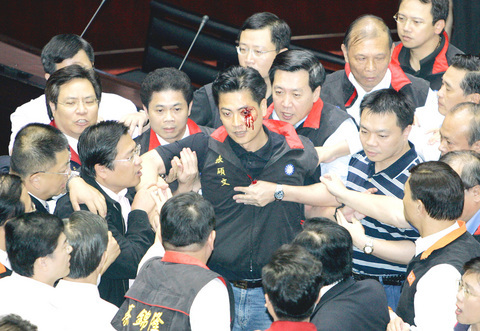The SEPTA strike finally ended early this morning. In a way, losing mass transit was beneficial: with a 90-minute commute on foot, I had some forced spare time to listen to podcasts on my way to and from campus, including Face The Nation and Meet The Press. The episodes two weekends ago, coming in the wake of the Scooter Libby indictment, were most amusing.
 But this weekend, it was all about Alito. And I had to hear Democrats on both shows go on about how “he wanted to strip-search a 10-year-old.” The case was Doe v. Groody, 361 F.3d 232 (3d Cir. 2004), text available here. Now, I know these senators must know better—they went to law school, for feck’s sake. So let’s get this straight.
But this weekend, it was all about Alito. And I had to hear Democrats on both shows go on about how “he wanted to strip-search a 10-year-old.” The case was Doe v. Groody, 361 F.3d 232 (3d Cir. 2004), text available here. Now, I know these senators must know better—they went to law school, for feck’s sake. So let’s get this straight.
- The searches took place as part of a drug bust. The suspected dealer is referred to as “John Doe.”
- When the police applied for a search warrant, they asked several times to be able to “search all occupants of the residence and their belongings to prevent the removal, concealment, or destruction of any evidence requested in this warrant.” In fact, it says “all occupants” several times, as if to scream “DON’T LET ANYONE GET AWAY!”
- When they got the warrant, the box marked “premises and/or persons to be searched” said “John Doe” and gave some of his personal information. This information filled up the entire box on the form.
- The police conducting the raid knew there were going to be women in the house, and didn’t want the suspected dealer to hide the goods on the women, so they got a female meter maid to go in with them.
- The meter maid took the wife and daughter of the suspect into the bathroom and had them strip down to show they didn’t have anything hidden in their clothes.
- After this happened, the victims sued the police officers individually under Section 1983. The police officers argued that they should get qualified immunity because they didn’t violate “clearly established statutory or constitutional rights of which a reasonable person would have known.”
- The district court rejected this argument and decided the officers should be liable. They appealed. Alito was one of the three-judge panel who got the appeal.
- Two of the judges voted to affirm the district court’s decision, since the warrant only said “John Doe.” Alito dissented on the grounds that the officers clearly intended to get a warrant to search everyone, and had a decent reason to believe they were given the right to do so.
Now, criticizing Alito on this last issue is one thing, but he certainly isn’t in favor of strip-searching children left and right. All he wanted was to keep police officers from being sued when they were doing something they thought they were authorized to do. If you want to go after perverts in the government, go after Scooter.






